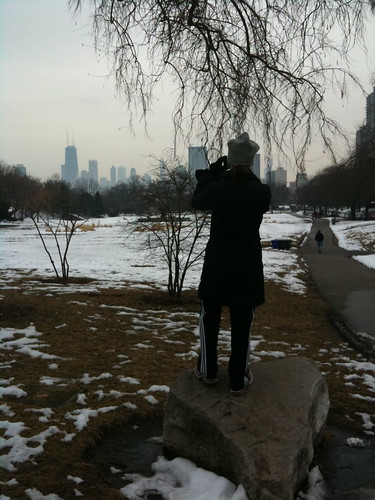I didn't learn until this evening that poet
Lucille Clifton passed away this morning. Just a few weeks ago I'd posted a congratulatory note here to her on her receipt of the
Poetry Society of America's
Centennial Frost Medal. As J's Theater readers know, I'm a huge fan of hers and was fortunate to have this extraordinarily humble, generous, wise, perspicacious, funny, gentle, and fierce poet as a teacher, briefly, for several summers (1998-99) at the
Cave Canem Foundation's Writers Workshops, where I was able to see up close how deeply and broadly she did see, into poems and people. Ms. Lucille, as we called her, once took a fellow poet's poem that was as forbidding as anything any postmodernist might have dreamt or typed up, and patiently read it, studied it--the rest of us were puzzling over it--and after rearranging several stanzas, offered in her kind way a suggestion of what resulted that brought amazement to all of us, including the poet: the poem was now not only highly original, but comprehensible, moving, a real accomplishment. I witnessed her do this again and again, which is to say, teach, even with work that was very unlike her own. It's probably fair to say that every poet who came into close contact with her, as a teacher, learned a tremendous deal, not only about how to write, but to think, about humility, about generosity, about how one's life is central to one's work, even if it's nowhere or everywhere apparent in the surface of the poem. I often use the word "lovely" to describe people and artworks I like, in part because I love the word and because I think these fellow human beings and works are full of love, and Ms. Lucille was truly lovely, in the sense of being full of love despite the many difficulties she faced over the years. She conveyed this love, of self, of life, of others, despite the hardships, in part through her work and in part through her wonderful stories, which she shared when she taught or read. One of the best conversations I ever saw, which brought tears to mine and others' eyes, involved Ms. Lucille and Ms. Sonia Sanchez, another remarkable poet and teacher. I use the word love too because I love how Ms. Lucille carried herself in the world, how she would wield her fierceness when necessary, how she used it to deflect the pain she probably felt at times when people could not appreciate how she distilled language into something often astonishing. She wrote about being a woman, being black, being a black woman from a working-class background, being a daughter and mother and wife; she wrote about living and surviving, surviving the loss of her mother and cancer and all the other things that life brought her; she wrote about the larger issues we as a society face, including the events of September 11, 2004; she wrote about the necessary courage to speak the truth, her truth, through writing, which her readers recognized as soon as they entered her poems.
My abiding appreciation of her really began back in 1995, when I was teaching 7th graders in New York City, and quickly learned that a few poets spoke directly and immediately to both them and me:
Stanley Kunitz; Langston Hughes; Nikki Giovanni; Willie Perdomo; Nicolasa Mohr; and
Lucille Clifton. The students could see and hear and feel in the poems of hers that we read from
The Book of Light (Copper Canyon Press, 1992), which had only just appeared a few years before, that here was someone who knew how to take her life experiences and turn them into art. I want to repost the second poem in the book, "june 20," which captures the candor and simple but never simplistic power of Ms. Lucille's art:
june 20
i will be born in one week
to a frowned forehead of a woman
and a man whose fingers will itch
to enter me. she will crochet
a dress for me of silver
and he will carry me in it.
they will do for each other
all that they can
but it will not be enough.
none of us know we will not
smile again for years,
that she will not live long.
in one week I will emerge face first
into their temporary joy.
Copyright © Lucille Clifton, 1992, 2010. All rights reserved.
Lucille Clifton with two of her daughters
and her granddaughter before the Ruth Lilly Prize event
A few years ago, Lucille Clifton was in Chicago to receive the
Ruth Lilly Prize for Lifetime Achievement from the
Poetry Foundation, and
I blogged about it, snapping photos as I'm wont to do, and offering one of my little writeups that probably sound to some readers like boilerplate. I mention that event because Ms. Lucille read some of work and spoke to the audience, showing her customary graciousness, bravery, and dignity, and letting everyone know that the award, which had never gone to a Black woman writer, was very well deserved. I'm very grateful to have had the opportunity to be present when Ms. Lucille received that honor, and to have witnessed her being in the world. She was one of the very best, in so many ways. I can only thank her, and know that her work will continue to live on, in me and many others.
Lucille Clifton was born
Thelma Lucille Sayles in
Depew, New York, in 1936, and grew up in
Buffalo. She graduated from high school at the age of 16 and won a scholarship to
Howard University, where, as she noted in interviews and public discussions, she was a contemporary of
Toni Morrison and
Amiri Baraka, and got to know with
Sterling Brown. She later attended
Fredonia State Teachers College, where she met her husband,
Fred Clifton, and began writing poetry, a pursuit that would really flower when the great African-American poet
Robert Hayden selected her poems for the
YW-YMCA/Discovery Award, which led to her acclaimed first book,
Good Times: Poems (1969). She went on to publish a dozen volumes, including
Good News About the Earth: New Poems (1972),
An Ordinary Woman (1974),
Two-Headed Woman (1980),
Next (1993),
The Terrible Stories: Poems (1996), and
Voices: Poems (2008). She also published two memoirs,
Generations (1976) and
Good Woman: Poems and a Memoir, 1969-1980 (1987), and many books for young and adolescent readers. Ms. Lucille taught at
Coppin State University, University of California-Santa Cruz, St. Mary's College, Maryland, and
Duke University, among other institutions, and was the
Poet Laureate of Maryland from 1979 to 1985. As I noted, she also taught at the Cave Canem summer workshops. Over the years, both inside and outside the classroom, she nurtured so many poets of all ages, and encouraged them to read widely and critically, and to write to the limits of their ability. Her many honors have included the 1997
Lannan Literary Award for poetry, the 1997
Lenore Marshall Poetry Prize, the 1997
Los Angeles Times Poetry Award, the 1999
Lila Wallace/Reader's Digest Award, the 2000
National Book Award for
Blessing the Boats: New and Selected Poems, 1988-2000, and three Pulitzer Prize nominations. Lucille Clifton lived and wrote and taught for many years, and we are all the richer for it.




































